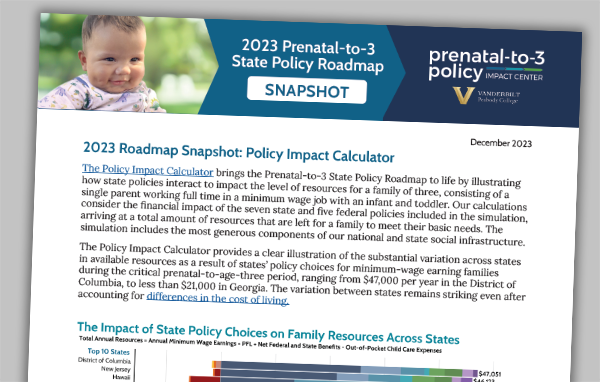The Virginia Early Childhood Foundation contracted with us to estimate the impact of the state of Virginia’s one-year $309 million investment in its Early Childhood Care and Education (ECCE) for children under the age of 5 and their families, as well as the potential return on investment to the state.
In the resulting report, we articulate how ECCE impacts children under age 5 and their families by identifying the research-based outcomes associated with high-quality ECCE. We quantify the children and families who could reach each outcome as a result of Virginia’s investment. We then identify the associated economic benefits and cost savings.
Leveraging temporary federal pandemic funds, the state of Virginia invested significantly in ECCE. This investment supports both industry stabilization and program enhancement, which increases the availability, affordability, and quality of ECCE for families through investment in quality improvement and enhancement of two state programs, the Child Care Subsidy Program and the Mixed Delivery Program. Both programs provide free or subsidized child care to families with low-to-moderate incomes.
Our estimates indicate that Virginia’s investment yields substantial short- and long-term returns to children, families, and the state, resulting in:
- increased parental employment and family earnings,
- reduced poverty and child maltreatment,
- a lifetime of improved educational achievement for children, and
- hundreds of millions of dollars in state economic returns for years to come.
Although the specific estimates included in the report are distinct to Virginia’s child care investment and state context, the message is true across states: child care is a good investment. This detailed exploration of the return on child care investments—including concrete estimates that are easy for the public to understand—can inform efforts to improve state child care systems across the country.
Explore the value of Virginia’s substantial expansion of ECCE access.
Recommended Citation
Osborne, C., Kresse, A., Skatter, N., Xu, N., Huffman, J., & Craig, S. (2023). Early Investment, a Lifetime of Returns: Articulating the Value of Early Childhood Investments in Virginia. Prenatal-to-3 Policy Impact Center. https://pn3policy.org.
© September 2023, Prenatal-to-3 Policy Impact Center, All Rights Reserved. The Prenatal-to-3 Policy Impact Center at Peabody College of Education and Human Development, Vanderbilt University translates research on the best public investments into state policy actions that produce results for young children and society.



